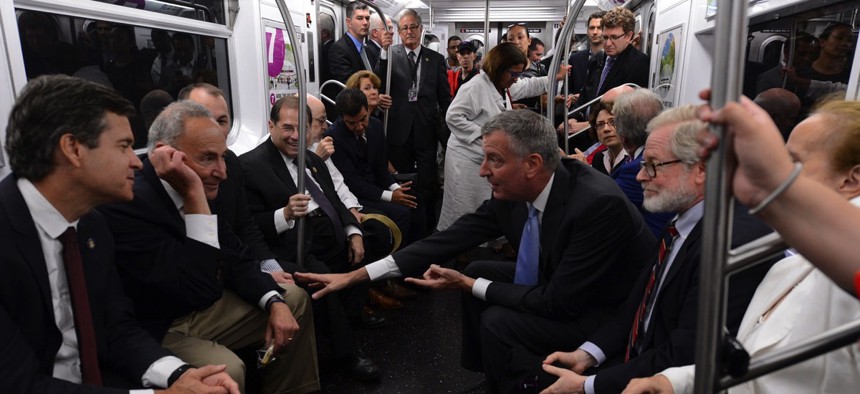So Much Official Passive Aggressiveness in New York; Utah’s Booming Booze Business

Elected officials take the ceremonial first train Sunday on the 7 line out of the newly dedicated 34 St-Hudson Yards station. Photo by Marc A. Hermann / MTA New York City Transit

Connecting state and local government leaders
Also: California city faces stiff water fines and Richmond’s municipal woes.
Here’s some of what we’ve been reading today …
NEW YORK CITY, New York: Usually, the grand opening of a major transportation infrastructure expansion project is a time to celebrate. And while Sunday’s opening of the extension of New York City’s No. 7 subway line to 34th Street and 11th Avenue on Manhattan’s West Side was certainly a moment for celebration, it came at a time of great passive-aggressive tensions between New York City Hall and the state government in Albany. Relations are already tense because of interpersonal conflicts between New York City Mayor Bill de Blasio and New York Gov. Andrew Cuomo, who wants the city government to pony up more money to fund the city’s subways, which are controlled by a state agency, the Metropolitan Transportation Authority.
As Politico New York reports, the mayor said this following remarks by MTA Chairman Tom Prendergast, who had told the crowd that the MTA needs the mayor’s help:
“We’re very proud of the $2.4 billion we invested in this project right here, $2.4 billion dollars,” said de Blasio. “I think it’s very important we remember the facts. The city of New York and the people of New York are the backbone of the funding of so much of the MTA. We pay 73 percent of the MTA budget through the city government’s contribution, through the fares our people pay, the tolls our people pay, the taxes our people pay. We are doing our share.”
Last week, Politico reported that Prendergast partially blamed the derailment of a subway train in Brooklyn on City Hall, something a spokesman for the MTA denied. [Second Avenue Sagas; Politico New York]
SALT LAKE CITY, Utah: An influx of non-Mormons into Utah since the 1990s and a vibrant hospitality and tourism industry has boosted alcohol consumption in the Beehive State. According to an analysis by The Salt Lake Tribune:
[S]ales at Utah's 125 liquor outlets shows a 153 percent increase in liquor sales since 2002, from $156.2 million to $396 million. Even adjusted for inflation, sales have nearly doubled, and per capita spending on alcohol has grown by more than 50 percent.In 2002, for example, the average Utahn drank 21 glasses of wine, 61 shots of hard liquor and 2 1/2 pints of heavy beer — the full-strength beer sold in liquor stores.
By last year, that consumption had jumped to 28 glasses of wine, just under 80 shots of hard liquor, and 4 1/2 pints of heavy beer. The figure does not capture the beer sold at grocery stores and convenience stores.
Despite the increase in alcohol consumption, Utah “continues to struggle with the misperception nationally that its arcane liquor laws make it impossible to get a drink.” [The Salt Lake Tribune]
NASHVILLE, Tennessee: Mayor-elect Megan Barry, who won election last week, will have a short transition to the Nashville’s mayoral office when she’s sworn in on Sept. 25. According to The Tennessean:
Over the next two weeks, Barry — who campaigned on a clear progressive agenda and continuation of the pro-business politics of Dean — is tasked most immediately with piecing together the mayor's office staff who will join her. She says she'll soon have a transition team and plan to help guide the change in administrations. From there, she's expected to map out some immediate goals for what is often defined as a new officeholder's first 100 days.
Some key personnel decisions could come by the time she’s sworn in, including the creation of a chief operating officer position who would run daily operations of the Metropolitan Government of Nashville and Davidson County. [The Tennessean]
HEMET, California: The water agency for this city in Southern California’s Inland Empire and eight other water providers in the state are facing the prospect of heavy fines for not cutting back enough on water use.
“These suppliers were the farthest off the mark,” Max Gomberg, the State Water Resources Control Board’s senior environmental scientist said, according to the Press Enterprise. “We don’t think their conservation programs are really where they need to be.”
The state has directed Hemet’s water agency to reconsider its rates, add a drought surcharge and expand conservation programs. [Press Enterprise]
RICHMOND, Virginia: All is not well with municipal services in the capital city of the Old Dominion. As the Richmond Times Dispatch details:
Grass is overgrown, requests for bulk trash pickup are stagnating, the police force is understaffed, and the problems are projected to increase, states a report submitted last week to Richmond City Council. The administration blames the council’s decision to shift $9 million set aside for vacant positions to the city’s school system this year. It warns of layoffs among inspection and permitting officers, curtailed leaf collection, and problems maintaining technology.
All this, naturally, “rankles” members of the Richmond City Council. “This is a very difficult time for the city,” Councilmember Chris Hilbert said, according to the Times-Dispatch. “People are very disappointed in what’s going on at 900 East Broad Street.” [Richmond Times-Dispatch]
Photo by Marc A. Hermann / MTA New York City Transit)
Michael Grass is Executive Editor of Government Executive’s Route Fifty.

NEXT STORY: As Connecticut Bans Capital Punishment, Arkansas Prepares to Resume Executions





